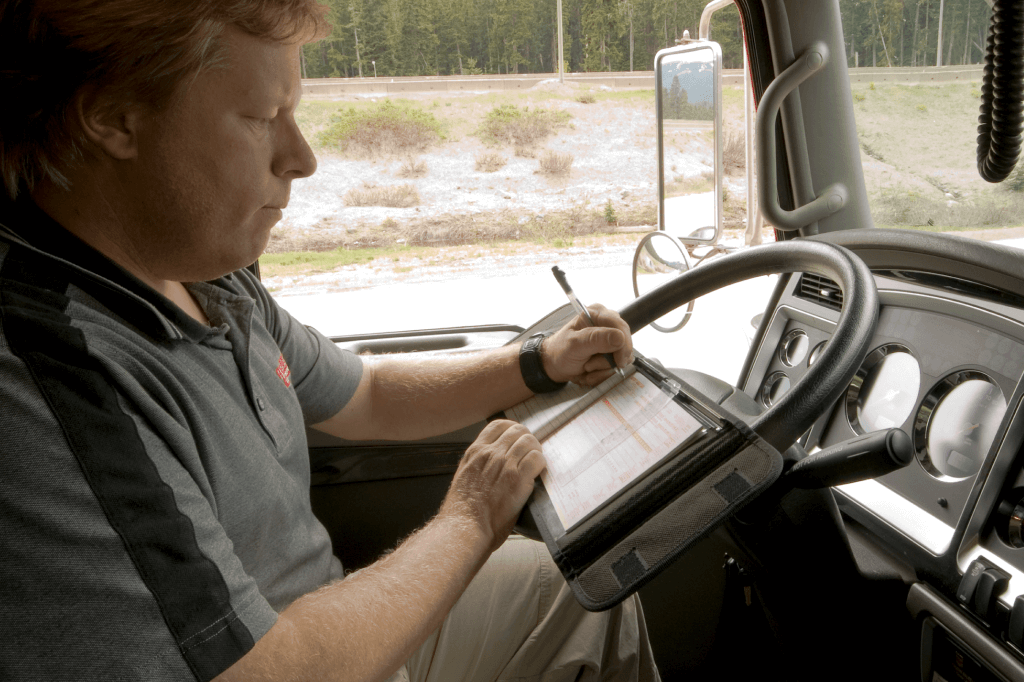IFTA Reporting: Everything You Need to Know

You are probably already aware that there is a fuel tax for truckers. But what is IFTA fuel tax reporting, and how does it work? Let’s look at the IFTA reporting requirements, who needs to report, and what you need to do to stay compliant. Here is everything you need to know about reporting fuel tax.

What is IFTA reporting?
The International Fuel Tax Agreement, or IFTA, is a streamlined method of fuel tax reporting across jurisdictions. Before the IFTA, truckers had to deal with each state and Canadian province separately. Under the IFTA, you report and pay your fuel taxes to your base state (where the qualified motor vehicle is registered), and the state distributes the money to each relevant jurisdiction.
What is IFTA reporting? It’s simply the process of filing and paying your fuel taxes to your base state. But your report must be accurate since it will determine how much money each jurisdiction receives.
Who needs to submit an IFTA report?
Anyone who transports goods or people across state lines or the Canadian border for profit is subject to IFTA reporting requirements. More specifically, you’ll need to report your fuel taxes if any of these apply:
- Your truck has three or more axles
- Your truck weighs more than 26,000 pounds
- You use your truck in a combination that exceeds 26,000 pounds total
Of course, regulations are always subject to change. Make sure you are familiar with the latest guidance from your base state.
When do IFTA reports need to be filed?
IFTA reporting is due quarterly or every three months. You must file your report by the last day of the month following the end of the quarter. Here are the specific filing deadlines for each quarter:
- January through March (First Quarter). Due April 30
- April through June (Second Quarter). Due July 31
- July through September (Third Quarter). Due October 31
- October through December. Due January 31
How do you file an IFTA report?
First, you will need to obtain an IFTA license in your base state and a decal for every truck you operate across state lines or the Canadian border. Every state’s process is slightly different, so you’ll need to learn the application process for your state.
Once you have your license and decal, you must follow a step-by-step process every quarter. As you work through the steps, remember that you calculate total numbers for the entire quarter. Here are the steps:

- Track your mileage. You are required to record your actual odometer reading every time you cross a state or provincial line. You can do this by hand, but using an automated tracking device is easier and more reliable. Note that to be IFTA compliant, your device must ping at least every 15 minutes. Add up how many miles you drove total in the quarter, regardless of jurisdiction.
- Keep your receipts. Log the total number of gallons of fuel you purchased in each state. For each purchase, you will need to know where and when you fueled up, what type of fuel you bought, the price per gallon, and how many gallons you bought.
- Determine your average miles per gallon. Now that you know your total mileage and fuel purchases for the quarter divide the total miles driven by the total gallons purchased. The result is your average miles per gallon.
- Calculate your total fuel purchases in each jurisdiction. For each state or province, add up the total number of miles you drove in that state. Divide that number by your average fuel mileage, determined above. The result is your total fuel consumption in that location. Remember to do this separately for each jurisdiction.
- Find out how much fuel tax you owe to each location. You can use the IFTA chart to look up the fuel tax rate by jurisdiction and fuel type.
- Calculate your payment or refund. For each location, add up how much fuel tax you owe. Then subtract the fuel taxes you already paid. The result is the payment you need to make or the refund you can get.
- File your report. There are three different methods for IFTA filing: online, by mail, or in person. An online filing is considered received the day you submit it. A mail-in filing goes by the postmark date, while an in-person filing uses the delivery date to the office.
How do you pay IFTA quarterly tax returns?
You can pay online, by mail, or in person. Just remember to submit your payment by the deadline, or you will have to pay penalties and interest. Like your report, your payment is considered made on the date it is submitted online or in-person or on the postmark date if mailing it in.
What happens if you don’t file an IFTA report?
If you don’t file your IFTA report within 30 days of the deadline, your IFTA license will be suspended, and you will receive a jeopardy assessment from the IRS. This is a serious financial penalty imposed when the IRS believes it risks losing money. You will then have 60 days to file and pay (including interest and penalties) before the jeopardy assessment takes effect.

If you file but don’t pay by the deadline, you will owe additional money in interest and penalties. You have 90 days from the deadline to pay in full, including the extra fees. You will be subject to the same penalties as not filing (jeopardy assessment and license suspension) if you don’t. You’ll then have another 60 days to pay in full before the jeopardy assessment becomes active.
Once you have filed and paid, you must apply to your base state to have your IFTA license reinstated.
Automate IFTA reporting
If this all sounds like a lot of work, you’re right. Fortunately, you can use automated IFTA reporting tools, like the Truckstop IFTA, to simplify the compliance process down to a few clicks. Instead of digging through a shoebox full of receipts each quarter, you can start when you create a load. Track your mileage electronically and enter your fuel receipts as you go. Then you can generate and file your quarterly reports quickly and easily. Just be sure to save your receipts. In the unlikely case of an audit, you’ll need to produce them.
Best of all, our IFTA reporting tool is fully integrated into our TMS, ITS Dispatch which includes an entire toolbox of solutions for all your documentation needs. Sign up for autmoated IFTA reporting today and let Truckstop take the hassle out of your IFTA reporting.

Find out how our platform gives you the visibility you need to get more done.
Get helpful content delivered to your inbox.
Schedule a demo.
Find out how our platform gives you the visibility you need to get more done.





